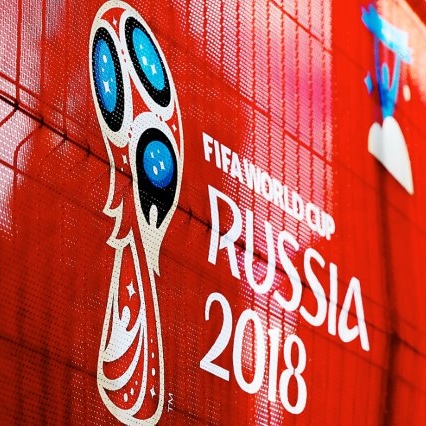click to dowload our latest edition
CLICK HERE TO SUBSCRIBE TO OUR NEWSLETTER


Published
6 years agoon
By
adminEMILY BURACK
Still, there are plenty of Jewish storylines surrounding the international event, which is being held in Russia, and began this week.
The announcer who made “¡GOOOOOOOAL!” famous is Jewish.
While Andrés Cantor, an Argentine Jew who grew up in America, didn’t invent the ridiculously long call for a score, he certainly popularised it. The call is oddly reminiscent of a long blow on the shofar. This World Cup will be Cantor’s ninth as a commentator, and he will serve as lead announcer for the Spanish-speaking Telemundo network. Cantor’s Romanian and Polish grandparents fled Europe during World War II. At this World Cup, Cantor will be joined by his 24-year-old son Nico, also a sportscaster and sports journalist. Nico told The Washington Post last week: “I try to find my own voice.”
Israel didn’t qualify, but you can still root for two Israel-based players.
Like the last World Cup, and every World Cup besides the one in 1970 for that matter, Israel did not qualify this year. At the 1970 competition in Mexico, Israel qualified as an Asian team, but shortly after that, it was expelled from the Asian Football Confederation due to political pressure from its Arab neighbours. Since then, Israel has had to compete and qualify in the European division – a much harder task. So while there are no Israeli players in the World Cup, two footballers who play for clubs in Israel will be competing. John Ogu, a midfielder for Hapoel Be’er Sheva, is on the Nigerian team, and Predrag Rajkovic, a goalkeeper for Maccabi Tel Aviv, plays for Serbia. So, maybe rooting for Nigeria or Serbia could feel a little bit like cheering for Israel.
Colombia has a Jewish coach.
Jose Pékerman is the 68-year-old Argentine coach of the Colombian team, which has improved its quality of play dramatically over the past decade. The grandson of Ukrainian immigrants, Pékerman started his soccer career as a kid at the local Maccabi Jewish youth club in Entre Rios, a province north of Buenos Aires. At one point, he lived in Villa Crespo, a Jewish neighborhood of Buenos Aires. He played professional soccer for seven years, but his career as a coach has been much more notable. From 2004 to 2006, he guided the Argentina squad, a perennial powerhouse. (He was the coach who called up a young Lionel Messi to his first World Cup.) Pékerman resigned following Argentina’s loss in the 2006 World Cup quarterfinals, but six years later, he was tapped to lead the Colombians. Before the 2014 World Cup, Colombia had not qualified for the tournament since 1998, but reached the quarterfinals under its new coach. Pékerman, who received Colombian citizenship after the team qualified in 2014, said helping Colombia return to the World Cup was “one of the greatest joys in [his] life”.
A famous Jewish player-turned-commentator will be on the Telemundo team.
Juan Pablo Sorín, now 42, was a famous player for Argentina who captained his country’s World Cup team in 2006, when Pékerman was head coach. He played for some of Europe’s best club teams, including Barcelona, Juventus, Paris Saint-Germain, and Villarreal, before retiring in 2009. He started working as a pundit in 2012, and will contribute commentary for Telemundo this year.
Jerusalem’s Jaffa Gate will be turned into a soccer goal during the semifinals.
A nonprofit called Kulna Yerushalayim will host a shootout at the Jaffa Gate, one of the seven entrances to the Old City of Jerusalem, where young Jewish and Arab residents of Jerusalem will try to score. The organiser, Dror Amedi, hopes that a prominent goalie (Gianluigi Buffon, Oliver Kahn, Fabien Barthez, Iker Casillas, or Peter Schmeichel) will participate in the event. Amedi explained to The Times of Israel, “Our goal is to take an event that unites the world and has become a symbol of fraternity between nations, the Soccer World Cup, and use it to create bonds between Jewish and Arab youth in Israel.” During the shootout, the World Cup will be broadcast on the walls of the Old City.
There’s an app for Jewish tourists visiting Russia.
The app, called “Soccer-hay” includes a guide to synagogues, local rabbis, and where to find kosher food. It is available for iOS and Android. Additionally, according to Chabad.org, the Jewish Community Center of Moscow will host a multilingual information desk available daily. It’s hard to estimate how many Jewish tourists will attend the tournament, but the International Sports Travel Agencies Association estimates that 10 000 Israelis will make the trip.
Could Israel show the World Cup on TV for free in the Arab world?
Israel’s Foreign Ministry announced in March that the country’s national broadcaster plans to show the tournament in Arabic to its neighbours for free. The move would help fans in countries such as Egypt, which qualified for the World Cup but did not purchase rights to air the games. Qatar’s monopoly over the tournament’s Arabic-language rights has made watching the tournament in Arabic expensive for fans. However, FIFA, the international soccer body, shot down Israel’s idea, according to a statement reported by The Jerusalem Post. “The Israel Broadcasting Corporation… is not authorised to broadcast any 2018 FIFA World Cup content (including any match coverage) outside of Israel. [Qatar’s] beINSPORT is the exclusive media rights licensee for the Middle East and Northern Africa region,” the statement read. Israel has not commented.
(JTA)
